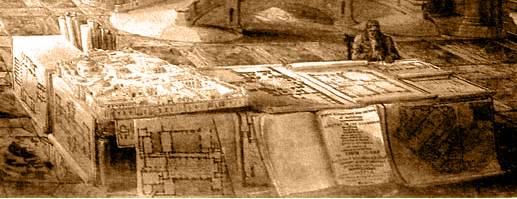
politics of doing &
human resources
management philosophy
 |
history
of practice, politics of doing & human resources management philosophy |
Ovidio
Sbrissa & The Architect's Workshop is an architectural firm based in Ottawa and
environs,
practicing in a contemporary Canadian real property development
landscape
where "maintenance" ("client oriented service") predominately dictates
architectural expression.
Having completed over five hundred "maintenance" projects to date, (ranging from the every-day of private, institutional, health, hospitality, recreational, heritage, developer, infrastructure, governmental, industrial and residential natures) it can speak, in common terms, of having a broad knowledge of the building sciences and engineering, of urban design and planning, and, of having an earned professional reputation for exigence, independence and innovativeness."Inde genus durum sumus experiensque laborum Albeit as a "minor " figure, this, as well as it's continual participation in national and international architectural competitions (for which it is recipient of first prizes and honorable mentions), and, the bestowing of honors and distinctions from local communities and organizations here and there around Ontario, has all proven to be an essential, thoroughly rewarding, "practical" preparatory experience molding it, richly 1 and polyhedrically within the panorama of the- idea- of- architecture 2.
"In these times and cultural climate, Canadian architecturing, even though knowing it has no more reason for being, not being able to represent anything more, not even itself, is finding shelter in mimicry, and sustenance on stale epistemologies. Current prevailing tendencies seem to reference a re-adaptation of an eclecticism and monumentalism fostering initiatives that ( uneasily derived from the uncertain results because of its taking advantage of modern experiments without carrying these out in a direct manner) embrace both the obligations of a contemporaneity imposed by the self-styled standard-bearers of a substantially anemic international avante-guard, and, the rhetoric of pervasive "theories" and "styles" which mostly govern multi-disciplined metropolitanists in their expediance in the creation of buildings (and cities) of power." 6 The influences of the architectural, come they from homogeneous or heterogeneous creative sources, are an essential ingredient for a national treasure ... certain gifts from its architectors. That they remain ever present precipitates the politics that all "who are passionately dedicated to the search for new "epiphanies" of beauty" 8 have for the finding the appreciation and involvement of informed and responsible patronage from society 9 "so that through their creative work as artists they may offer these as gifts to the world" 10.
"... |
|||
|
|
|||
| inclusions:
1. ...I can certainly imagine that they were all children, more or less fortunate, who attended schools, more or less interesting, who met women, more or less fascinating, who have written phrases on sheets of paper, more or less lost, who have thought of a spot in which they would have lived for all of their life, more or less affined to their place of birth. They have done some projects, more or less turned out, more or less finalized... ... Certo posso immaginare che sono tutti stati bambini, più o meno fortunati, hanno frequentato delle scuole, più o meno interessanti, hanno incontrato delle donne, più o meno affascinanti, hanno scritto frasi su fogli di carta, più o meno perdute, hanno pensato ad un luogo in cui avrebbero vissuto per tutta la vita, più o meno vicino al loro luogo di nascita. Hanno fatto dei progetti, più o meno riusciti, più o meno conclusi...
3. ceteri architecti rogant et ambiunt, ut architectent; mihi autem a praeceptoribus est traditum: rogatum, non rogantem oportere suscipere curam, quod ingenuus color movetur pudore petendo rem suspiciosam. nam beneficium dantes, non accipientes ambiuntur. Transl.4. "Architecture, it would seem, is the inescapable condition of our life: we had better know how deep are the roots of that condition. " -- Sir Colin St. John Wilson, "The Natural Imagination", The Architectural Review, January, 1989, v. 185, no. 1103, p. 64-70. 5.
"About these times Architecture was found out, and men began to use
more
policy both in their civil institutions, and manners, or customs of
living". 6.
Excerpt from "Penelope: the Crisis of Contemporary Architectural
Practice" 7.
Excerpt from "The Bow: An Upanishad for the Everday Architect"
8. JohnPaul II 9.
alla,
chthonioi daimones hagnoi,
O
holy divinities of our hells, To elicit such appreciation and involvement, architects must begin to communicate through the language of the "architect" and not through "maintenance jargon": engender "architecture", not just make "buildings". The architect should be just as concerned with proper application of "architectural codes" as one does the "building code"; with providing deontologically motivated service to "architecture" equivalent to that accorded to the public (client).10. JohnPaul II |
|||
| rhyzomes theoretical speculations deontology workbooks bulletin e-dialogues |
|
||